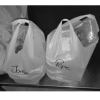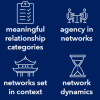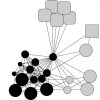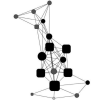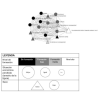DIMCOM
Community dimensions, personal networks, and social exclusion
Description
Spain’s recent economic growth helped it recover from the 2008-2014 crisis, but it has not benefited large sectors of the population. About 6 million people constitute the so-called insecure or precarious society (Standing, 2011) in Spain, i.e., people at risk of exclusion who do not have the resources to bounce back from a new crisis and have insecure income and housing. Despite the limitations of Standing’s proposal, his concept of “social income” (2010) is highly relevant, as it identifies all resources available to citizens, including social capital. The social income consists of 6 elements, namely (Standing 2013), (a) self-production of goods and services, (b) wages, (c) the value of support received by the family and the local community, (d) the benefits granted by companies and organizations to their workers, (e) direct or indirect services financed by the state and (f) private savings and investment interests. In the words of Standing, what characterizes the precarious is not the level of wages or income at a particular time, but rather the lack of community support in times of need, the lack of guaranteed business or state benefits, and the lack of private benefits to complement the income (emphasis added, 2013: 5).
In this project, we explore the contribution of this community dimension to the social income of sectors of the population that correspond to the “insecure society” emphasized by the VIII FOESSA Report (Foessa Foundation, 2019). The motivation is twofold: on the one hand, this group is at the prelude to social exclusion lacking the ability to cope with a new crisis, which justifies the need to know this reality in depth. On the other, the results of our previous research in this field highlighted both the key role of the community dimension to increase resilience and the erosion and deterioration of formal and informal support networks as a result of the crisis to the point that they became new sources of exclusion and formed a risk to mental health (Lubbers et al. 2020). Consequently, while the literature has amply shown the relevance of family relationships and friendships for well-being and mental health (Berkman, 1995; Cohen & Wills, 1985), this is not applicable to the precarious. For this reason, it is important to identify successful community initiatives and the role that these initiatives play in people’s lives. In this project, we study the contribution of the community dimension to the social support these groups of the “insecure society” receive, their distribution, what mechanisms are responsible for them, and what set of initiatives can strengthen their empowerment and sustainability.
This project is led by Hugo Valenzuela (egolab-GRAFO) and Miranda Lubbers, and was financed by the Spanish Ministry of Science, Innovation, and Universities.
Publications
-
SOCIAL NETWORKS AND THE RESILIENCE OF MARGINALIZED COMMUNITIES (2022). In: Snijders, T. A. B., Lazega, E., & Wittek, R. (Eds.), Social networks and social resilience (pp. 1-15). Edward Elgar Publishing, Cheltenham. Publisher's website (the chapter is open access)
-
CHOOSE, BUY, PAY - PARADOXES OF SHAME-RELIEVING PROCESSES AMONG IMPOVERISHED SPANIARDS AFTER 2008’S GREAT RECESSION (2022). Journal of Organizational Ethnography, 12 (1): 120-137. DOI
-
THE ETHNOGRAPHIC STUDY OF PERSONAL NETWORKS (2021). Etnografia e Ricerca Qualitativa, 2: 185-200. Publisher's website / Ask for a copy
-
THE RELATIONAL VULNERABILITY OF PEOPLE EXPERIENCING MULTIPLE EXCLUSION HOMELESSNESS (MEH) IN SPAIN (2021). International Journal of Environmental Research and Public Health, 18 (19): 10275. DOI / Open-access PDF
-
“SHE’S SURROUNDED BY LOVED ONES, BUT FEELING ALONE”: A RELATIONAL APPROACH TO LONELINESS (2021). Social Inclusion, 9 (4): 350-362. DOI / Open-access PDF
-
A PROPÓSITO DE LA VULNERABILIDAD RELACIONAL: REFLEXIONES PARA LA INTERVENCIÓN SOCIAL (2021). Documentación Social: Revista para Pensar la Intervención Social, 7: 1-9. Open-access PDF

